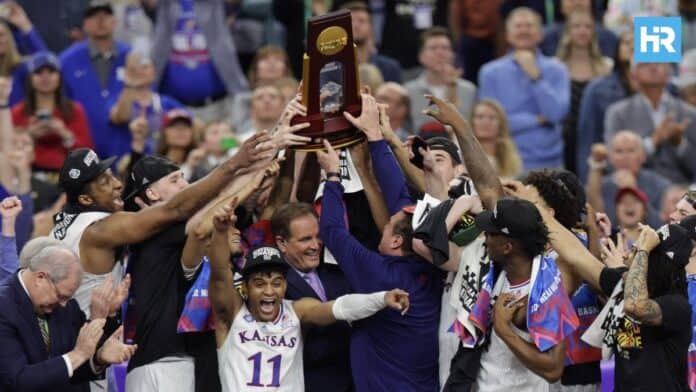NCAA basketball has always been exciting, filled with intense games and memorable moments. And some of the most amazing parts of these tournaments are the high scores.
Today, we’ll look closely at the top-scoring games in NCAA history, especially focusing on the years 1988 to 1990.
[su_box title=”Key Takeaways” box_color=”#003F81″ radius=”9″]
- Loyola Marymount’s teams from 1988-1990 led the nation in scoring and appeared in the top five highest-scoring NCAA tournament games.
- The highest-scoring game recorded was in the 1990 second round, where Loyola Marymount defeated Michigan with a staggering 264 points.
- Despite its offensive prowess, Loyola Marymount also struggled defensively, consistently allowing the most points.
[/su_box]
NCAA’s High-Octane Scoring Legends
When reflecting on the iconic March Madness moments, several coaching legends come to mind, such as John Wooden’s undefeated UCLA teams, Mike Krzyzewski’s Duke, and Adolph Rupp’s Kentucky.
However, none matched the skills of Paul Westhead’s Loyola Marymount teams in the late ’80s and early ’90s.
Loyola Marymount’s Scoring Legacy
From 1987 to 1990, coach Paul Westhead turned Loyola Marymount University (LMU) basketball into a scoring powerhouse.
Westhead’s approach was to play incredibly fast, leading LMU to score more points than any other team in the country for three straight years.
The team’s points per game jumped from 110.3 in the 1987-88 season to an impressive 122.4 by the 1989-90 season.
During this time, LMU didn’t just lead in scoring; they scored way more than any other team, setting a new standard in college basketball.
Record-Breaking Games in NCAA Tournament History
Loyola Marymount participated in the five highest-scoring games in the NCAA men’s basketball tournament history.
Each game shows off their strong scoring ability and, interestingly, their weak defense, leading to them giving up the most points in the country during that time.
Here’s a detailed look at those high-scoring games:
Loyola Marymount vs. Michigan, 1990 Second Round (264 points)
In what stands as the highest-scoring game in NCAA Tournament history, Loyola Marymount triumphed over Michigan with a score of 149-115.
Leading by a slim margin of 65-58 at halftime, LMU unleashed an offensive barrage, scoring 84 points in the second half alone.
Jeff Fryer led the charge with an impressive 41 points, shooting 15-for-20 from the field, which included 11 three-pointers.
Bo Kimble contributed 37 points, while teammates Terrell Lowery, Per Stumer, and Tom Peabody added 23, 21, and 14 points, respectively, to the monumental total.
Loyola Marymount vs. Wyoming, 1988 First Round (234 points)
LMU’s 119-115 win against Wyoming marked their first NCAA Tournament victory in 27 years. Bo Kimble was the standout performer, leading with 29 points, including four 3-pointers.
Mike Yoest was highly efficient, contributing 25 points on just nine field goal attempts and making 15 of 17 free throws.
Supporting efforts came from Hank Gathers, Jeff Fryer, and Mark Armstrong, who scored 19, 17, and 15 points respectively.
Despite Wyoming’s valiant 63-point effort in the second half, it was not enough to surpass LMU.
UNLV vs. Loyola Marymount, 1990 Elite Eight (232 points)
In this matchup, LMU faced the eventual national champions, UNLV, and suffered a defeat with a score of 131-101.
Despite the loss, Bo Kimble and Jeff Fryer showcased their scoring prowess with 42 and 21 points, respectively.
Terrell Lowery added 18 points from the bench. UNLV’s top scorers, Larry Johnson, Greg Anthony, Stacey Augmon, and Anderson Hunt, collectively scored 104 points, leading to UNLV’s highest-scoring game of the season.
Arkansas vs. Loyola Marymount, 1989 First Round (221 points)
In this high-scoring contest, Arkansas emerged victorious with a score of 120-101. Arkansas was led by Mario Credit, who scored 34 points and grabbed 13 rebounds.
Lenzie Howell also made significant contributions with a double-double of 27 points and 12 rebounds.
On LMU’s side, Hank Gathers led with 28 points, while both Kimble and Fryer scored 24 points each, although their shooting was less effective, combining for a 14-for-51 shooting performance from the field.
UNC vs. Loyola Marymount, 1988 Second Round (220 points)
After their first-round victory, LMU faced a tough UNC team and was defeated 123-97. UNC’s Ranzino Smith was a key player, scoring 27 points with a highly efficient 11-for-14 shooting performance.
Jeff Fryer matched Smith’s 27 points for LMU. Hank Gathers also contributed with 17 points, but UNC’s dominant first-half performance, outscoring LMU 65-40, set the tone for a decisive UNC victory.
Loyola Marymount’s Unique Play Style
Loyola Marymount’s approach to basketball did more than just rack up points; it fundamentally changed how other teams defended against them.
Even the best defensive teams found it tough to hold back LMU’s relentless attacks and were often pulled into fast-paced, high-scoring games.
At the height of their performance, LMU’s games consistently scored much higher than those of any other team.
This showcases the deep and lasting impact LMU had on how college basketball was played during that era.
Lasting Impact of Loyola Marymount
From the late 1980s to the early 1990s, Loyola Marymount’s basketball team crafted a remarkable chapter in NCAA basketball history.
Their ability to shatter scoring records marked a time when basketball was more than just about winning; it was about pushing limits and setting new benchmarks.
This team wasn’t just thrilling to watch; they also left a deep mark on the sport that still influences how teams think about and play basketball today.
Celebrating Loyola Marymount’s Scoring Records
Loyola Marymount’s incredible run in these high-scoring games really shows off the excitement of NCAA basketball.
Their knack for constantly breaking scoring records and speeding up the game has made a lasting impression on the sport.
Looking back at these legendary games, we’re reminded just how unpredictable and thrilling college basketball can be. Records are not just broken but smashed in amazing ways.








![Best Jersey City Restaurants [current_date format=’Y’]: Which NJ Restaurants Live Up to the Hype?](https://staging.hudsonreporter.com/wp-content/uploads/2024/06/Jersey-City-Restaurants-324x160.jpg)



![Best Bitcoin Casinos in [current_date format=’Y’] – Top 10 Crypto Casino Sites for BTC Games Bitcoin Casinos](https://staging.hudsonreporter.com/wp-content/uploads/2024/01/bitcoin-casinos-feature-324x235.jpg)
![[current_date format=’Y’]’s Best Bitcoin eSports Betting Sites – Where to Bet on eSports with Crypto bitcoin esports betting](https://staging.hudsonreporter.com/wp-content/uploads/2023/12/bitcoin-esports-betting-sites-1-100x70.jpg)
![Best Bitcoin Casinos in [current_date format=’Y’] – Top 12 Crypto Casino Sites for BTC Bonuses Bitcoin Casinos](https://staging.hudsonreporter.com/wp-content/uploads/2024/01/bitcoin-casinos-feature-100x70.jpg)
![Best Ethereum Casino Sites – Top 10 ETH Gambling Sites with Fast Payouts [[current_date format=’Y’] Update] ethereum casinos](https://staging.hudsonreporter.com/wp-content/uploads/2023/09/ethereum-casinos-100x70.jpg)
![Best Dogecoin Casinos for [current_date format=’Y’] – Top DOGE Gambling Websites for Fast Payouts [Updated] dogecoin casinos](https://staging.hudsonreporter.com/wp-content/uploads/2023/06/dogecoin-casinos-feature-100x70.jpg)
![Best Bitcoin Casinos in [current_date format=’Y’] – Top 10 Crypto Casino Sites for BTC Games Bitcoin Casinos](https://staging.hudsonreporter.com/wp-content/uploads/2024/01/bitcoin-casinos-feature-324x160.jpg)
![[current_date format=’Y’]’s Best Bitcoin eSports Betting Sites – Where to Bet on eSports with Crypto bitcoin esports betting](https://staging.hudsonreporter.com/wp-content/uploads/2023/12/bitcoin-esports-betting-sites-1-324x160.jpg)
![Best Ethereum Casino Sites – Top 10 ETH Gambling Sites with Fast Payouts [[current_date format=’Y’] Update] ethereum casinos](https://staging.hudsonreporter.com/wp-content/uploads/2023/09/ethereum-casinos-324x160.jpg)
![Best Dogecoin Casinos for [current_date format=’Y’] – Top DOGE Gambling Websites for Fast Payouts [Updated] dogecoin casinos](https://staging.hudsonreporter.com/wp-content/uploads/2023/06/dogecoin-casinos-feature-324x160.jpg)
![Best Ontario Sports Betting Sites – Top ON Legal Sportsbooks Online ([current_date format=’Y’]) Ontario Sports Betting](https://staging.hudsonreporter.com/wp-content/uploads/2024/04/Ontario-Sports-Betting-324x160.jpg)
![[current_date format=’Y’]’s Best Illinois Sports Betting Sites: Top 10 IL Online Sportsbooks [Updated] Illinois Sports Betting](https://staging.hudsonreporter.com/wp-content/uploads/2024/04/illinois-sports-betting-1-324x160.jpg)
![Best Betting Sites Not on BetStop Australia: Top Non-BetStop Bookies for Aussies [[current_date format=’Y’] Update] Betting Sites Not on Betstop](https://staging.hudsonreporter.com/wp-content/uploads/2024/04/Betting-Sites-Not-on-Betstop-324x160.jpg)
![Best Sports Betting Sites Georgia – Top 10 GA Online Sportsbooks [[current_date format=’F Y’] Update] Georgia Sports Betting](https://staging.hudsonreporter.com/wp-content/uploads/2023/11/Georgia-Sports-Betting--324x160.jpg)
![Euro [current_date format=’Y’] Betting Odds – Top Winner Odds for the UEFA European Cup, UK Edition [Update] euto 2024 odds](https://staging.hudsonreporter.com/wp-content/uploads/2024/04/euto-2024-odds-324x160.jpg)